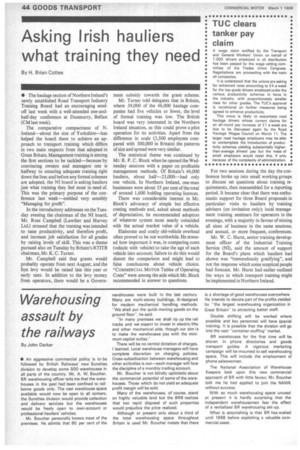Warehousing assault by the railways
Page 46

If you've noticed an error in this article please click here to report it so we can fix it.
By John Darker
• An aggressive commercial policy is to be followed by British Railways' new Sundries division to develop some 500 warehouses in all parts of the country. Mr. A. W. Boucher, BR warehousing officer tells me that the warehouses in the past had been confined to railborne goods only. The vast warehouse space available would now be open to all comers: the Sundries division would provide collection and delivery services but the warehouses would be freely open to own-account or professional hauliers' vehicles.
Mr. Boucher personally knows most of the premises. He admits that 80 per cent of the
warehouses were built in the last century. Many are multi-storey buildings, ill-designed for modern mechanical handling methods. "We shall put the quick-moving goods on the ground floor-, he said.
-In many premises we shall rip up the rail tracks and we expect to invest in electric lifts and other mechanical aids, though our aim is to make the warehouses pay with the minimum capital outlay."
There will be no central dictation of charges. I learned. Local warehouse managers will have complete discretion on charging policies. Cross-subsidization between warehousing and other acitivities is out—each manager will face the discipline of a monthly trading account.
Mr. Boucher is not blindly optimistic about the commercial potential of some of the warehouses. Those which do not yield an adequate profit margin will be sold.
Many of the warehouses, of course, stand on highly valuable land but the BBB realizes that too rapid disposal of such properties would prejudice the price realized.
Although at present only about a third of the total warehousing space throughout Britain is used Mr. Boucher insists that there
is a shortage of good warehouses everywhere. He intends to devote part of the profits yielded by "the largest warehousing organization in Great Britainto attracting better staff.
Double shifting will be worked where possible and key personnel will have special training. It is possible that the division will go into the vast "container stuffing" market.
BR warehouses for the first time will be shown in phone directories and goods transport guides. A vigorous marketing campaign will be mounted to sell warehousing space. This will include the employment of phone saleswomen.
The National Association of Warehouse Keepers look upon this new commercial approach of BR with little favour. Mr. Boucher told me he had applied to join the NAWK without success.
With so much warehousing space unused at present it is hardly surprising that the independent warehousemen fear the effect of a revitalized BR warehousing set-up.
What is astonishing is that BR has waited until 1968 before exploiting a valuable commercial asset.








































































































































































